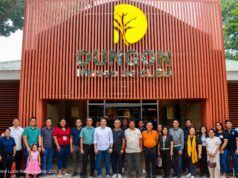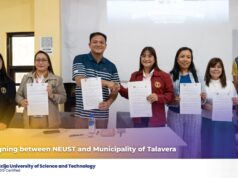CRISIS LEADER. Handshake between Mayor Morales and Aeta tribal Serrano seals agreement to seek peaceful dialog to resolve the crisis at Clark’s Gate 14. Photo by Bong Lacson
CLARK FREEPORT — Mabalacat City Mayor Marino “Boking” Morales has helped stave off a brewing crisis here last Friday after pacifying a group of Aetas from virtually putting the law into their own hands.
Morales was able to convince Robert Serrano, chairman of the Mabalacat Aeta Tribal Association (MATA), from setting up structures in this freeport’s Gate 14 area until a dialogue with Clark Development Corp. (CDC) President-CEO Arthur Tugade has materialized.
Earlier, Serrano reported that members of his tribe took over Gate 14 on the freeport’s northwestern side and began constructing structures in the area.
For this reason, CDC guards set up barricades and barred Serrano’s group from entering this freeport.
Because of the CDC barricade, members of Serrano’s group became isolated at Gate 14 which deprived them of food and other necessities.
The standoff heightened the tension between the Aetas and the CDC guards who had clashed in an earlier incident which left several members from both sides injured as well as destroyed government properties.
Serrano said Sitio Bilad in Barangay Marcos Village, Mabalacat City where they are relocated is in danger of being eroded due to heavy rains brought about by a recent typhoon and the southwest monsoon.
He said an access road leading to Sitio Bilad near the Korean Country Club has been eroded. He added that this left them no choice but to return to their ancestral domain at Gate 14.
“Mangamate kami nung eke gawang paralan (We will all die if we will not do anything),” Serrano said.
Just before noon, Morales met Serrano and some members of his tribe. Morales reasoned with Serrano not to force their way to Gate 14 and instead allow him to seek a meeting with the CDC leadership for a tripartite dialogue with them.
Morales also assured Serrano and his group that the city will be the one to construct the rehabilitation of the access road leading to Sitio Bilad if the CDC will not do something about it immediately to allow them safe access to their houses. Serrano estimated the road to be about 200 meters.
Two Mabalacat villages (Marcos and Macapagal), which lie on the northwestern side of this freeport, are mostly inhabited by Aetas.
In 2006, BB International Leisure and Resort Development Corp. signed an agreement with the CDC for the lease and development of a 200-hectare area at Gate 14 after conducting what the CDC said was a free, prior and informed consent (FPIC) with the National Commission on Indigenous People (NCIP) and the Aetas as provided by the Indigenous Peoples Right Act or IPRA law.
The area is part of the Clark special economic zone which falls within the ancestral domain of the Aetas.
But since the signing of the contract, BBI has yet to break ground for the development of the area which prompted the present CDC leadership under Tugade to review its agreement with the government-run firm.
As a result, BBI submitted a timeline of development which included a scheduled ground breaking next month and the CDC’s forfeiture of about 20 hectares of its leased property.
In the meantime, a tripartite dialogue is set on August 30 between the CDC, Morales and the Aetas represented by Serrano.




